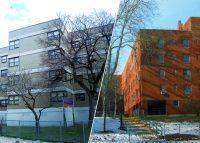Senate Majority Leader Chuck Schumer says the $40 billion allocated by the American Jobs Plan for public housing isn’t nearly enough to address a national “humanitarian crisis” unfolding in developments in New York City.
About 400,000 people live in a NYCHA development in the city, operated by the city’s housing authority. In an op-ed for City & State, Schumer called for boosting resources for public housing residents in New York CIty and across the country by doubling the allocation in the bill to $80 billion.
“I have pledged to use all of my power as majority leader, alongside my New York colleagues in the House of Representatives, to secure a funding package that can restore and transform NYCHA,” Schumer wrote.
Schumer cited examples of various problems in NYCHA buildings, from lead exposure to children to residents lacking gas and units missing either air conditioning or heat. The senator called for fixes to all these problems, as well as more “sustainable and efficient infrastructure,” better drainage and more working elevators.
In calling for the increase in funding, Schumer cited the ballooning cost of NYCHA’s capital needs. Those needs were estimated to be about $17 billion back in 2011, but now stand in excess of $40 billion.
Schumer’s op-ed echoes a demand the New York lawmaker announced in May with Rep. Richie Torres — a former New York City Council member who chaired its Committee on Public Housing — highlighting NYCHA facilities as a key example of dire need for increased federal investment.
In addition to a lack of resources, the management of NYCHA, one of the biggest housing authorities in the country, has been criticized by local politicians. Last year, Public Advocate Jumaane Williams called out Bill de Blasio’s administration for its management of the agency, which landed the administration at the top of a list of the city’s worst landlords.
Earlier this year, NYCHA announced a plan to overhaul the agency’s management system in conjunction with federal prosecutors and the U.S. Department of Housing and Urban Development. That could still be a ways away, however, as the first part of an implementation plan is due this month and the second due in June, before implementation can actually occur.
Read more

[City & State] — Holden Walter-Warner
